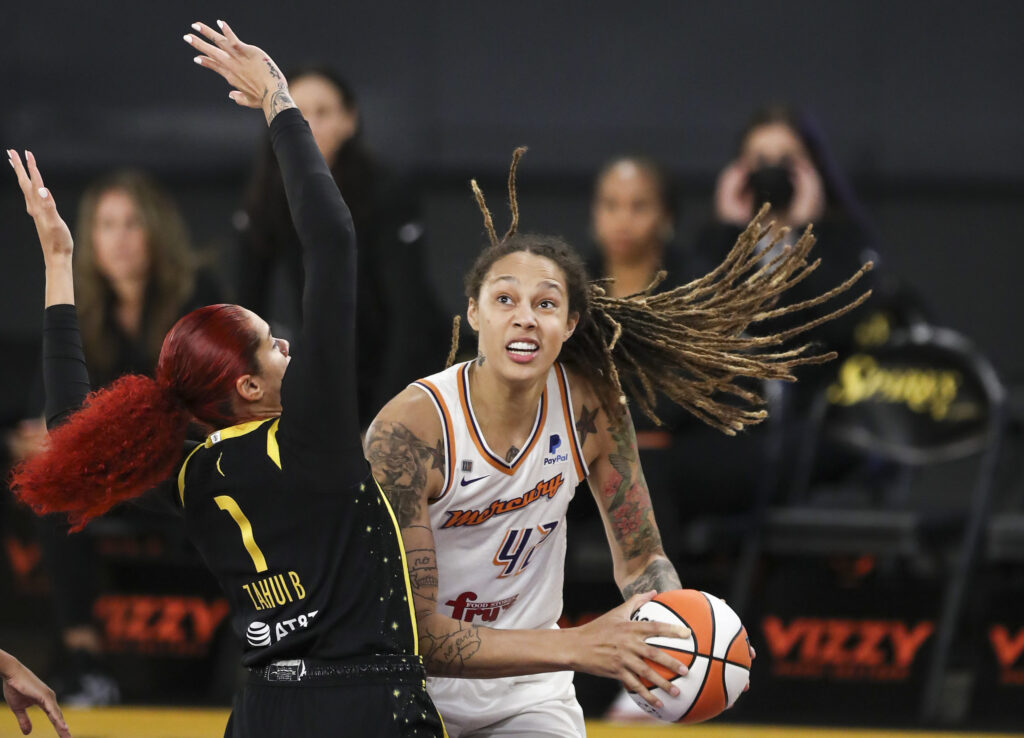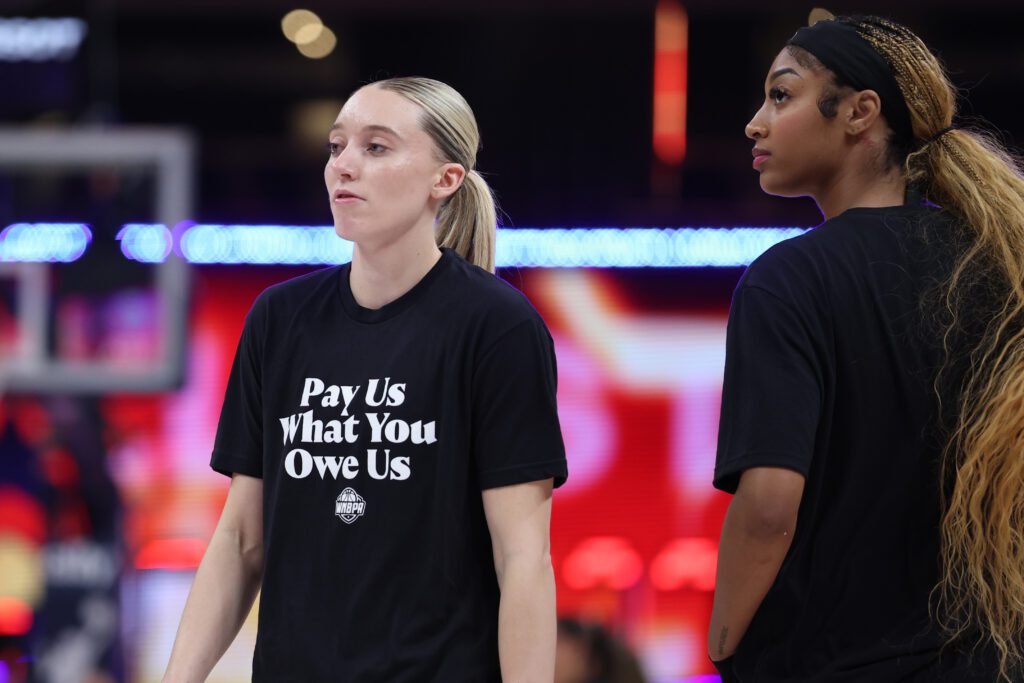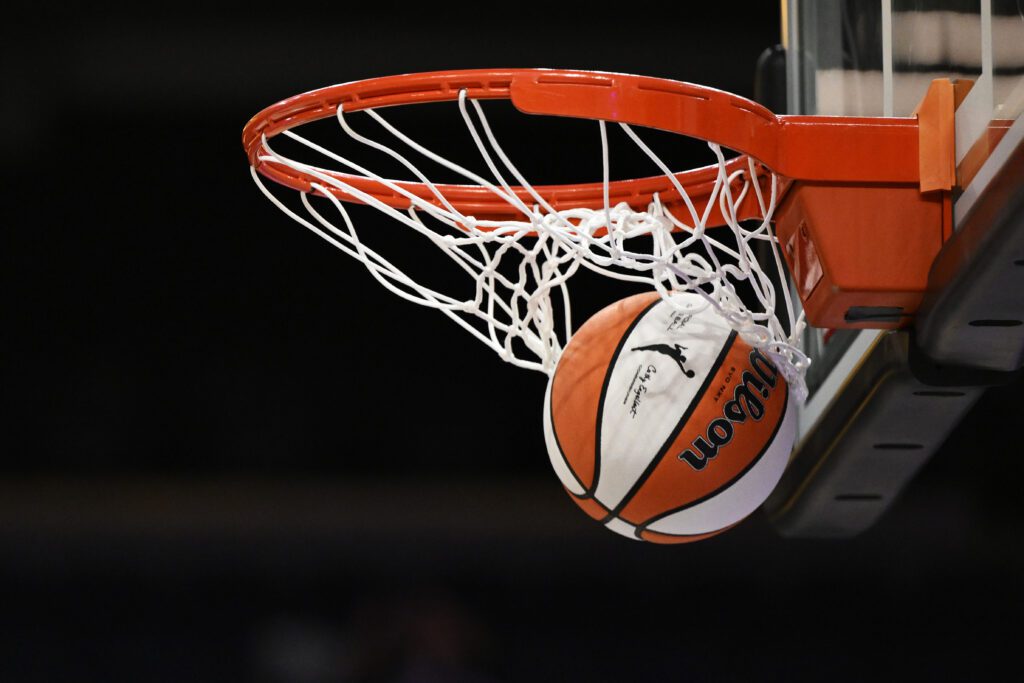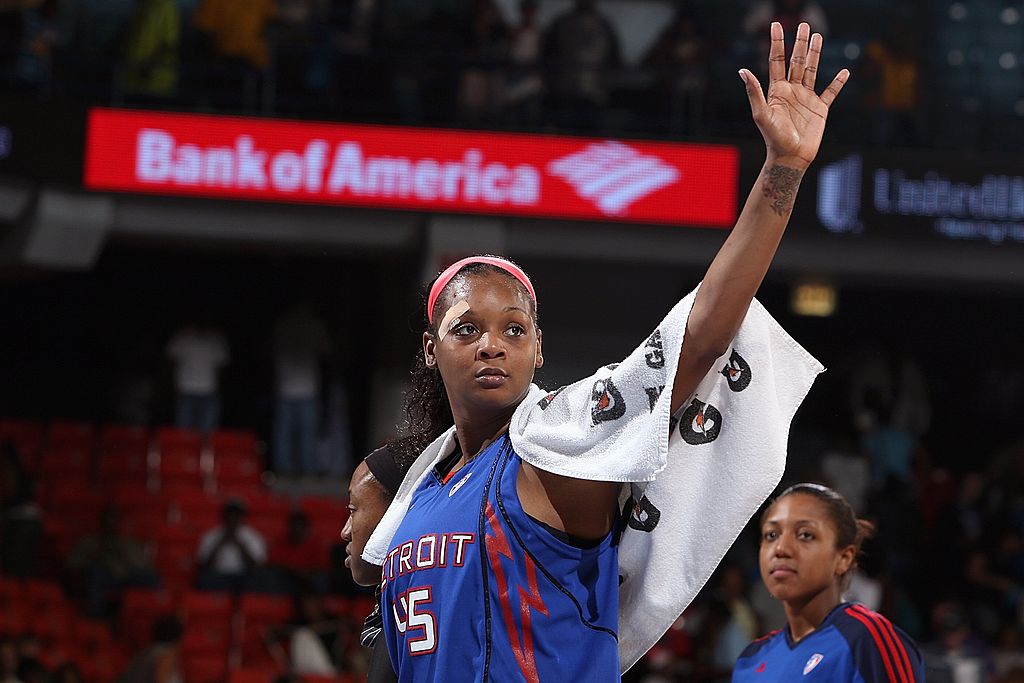When Sue Bird entered the WNBA in 2002, the league was just beginning to take small steps toward LGBTQ+ inclusivity. She remembers, for example, the New York Liberty introducing a “Kissing Cam” for gay women early in her career — only after a lesbian group protested the team’s treatment of LGBTQ+ fans by kissing during a televised game betwen the Liberty and the Miami Sol in 2002.
“What’s interesting is the league embracing its fan base, but then from a player’s standpoint, there really weren’t that many people who were open,” Bird says. “There weren’t that many players who were coming out. So it was kind of this interesting place because it was just this unspoken thing. Everybody knew it, but nobody really talked about it.”
It would take a decade for the culture to shift in a meaningful way, and almost two decades for the WNBA to become the most socially conscious and active professional sports league in the country.
In the years after the WNBA launched in 1997, it was clear the strategy was to market to certain demographics by portraying its athletes as family women and traditionally feminine. In 2000, the league issued a press release of a list of players who were recently married along with the names of their husbands. Queer athletes did not talk openly about their sexuality in the WNBA, just as it was largely taboo in society at the time.
The WNBA’s embrace of “family values,” as former Liberty player Sue Wicks explained in an October 2020 interview with Fanbyte’s Natalie Weiner, alienated its LGBTQ+ players and fans.
“That’s how it was promoted,” Wicks said, “and I wouldn’t say it was subtle because every advertisement featured families in the stands and that type of thing. They showcased the girls that had husbands or kids, or other family ties. And it certainly was a true representation — it’s one facet of the league, and it was the one that they were selling then.”
Wicks, whose career on the court is often overshadowed by the fact she was the first WNBA player to come out as gay and talk openly about her sexuality, was an outlier. Though she doesn’t consider herself a trailblazer, her courage forged the path that so many WNBA players now walk.
“Everything changes as time goes on, and I think we’re just at a point in life where we shouldn’t see what a person likes, who a person likes, or anything like that,” says Connecticut Sun guard Natisha Hiedeman. “I wish it could have been like that a long time ago, but I think it’s super important for everybody to just be who they are.”
***
In 2013, Brittney Griner sat at her first official press conference, ready to discuss the start of her WNBA career after being drafted first overall by the Phoenix Mercury. When Griner casually commented on her sexuality, it wasn’t considered a big deal. At that time, athletes who came out in professional women’s sports did so to little fanfare and media attention. It was a sign that society was becoming more accepting of queer women.
Griner’s authenticity had a ripple effect. Slowly but surely, other players came out, too — some outright, some in interviews, some never needing to make an announcement at all.
Elena Delle Donne, drafted second overall in 2013 and now a star with the Washington Mystics, believes the WNBA has always been a safe place for her to express herself, but she admits it took her some time to embrace that part of her identity.
“I came into the league and was not out, so over the years I was able to truly come into myself,” Delle Donne says. “I often felt like I was a robot at times because I wasn’t able to truly be myself until I was open and honest about my sexuality.”
In the spring of 2014, the NBA and NFL were having a reckoning of their own after Jason Collins and Michael Sam came out as gay. The WNBA went further, becoming the first professional sports league to launch a marketing campaign targeting the LGBTQ+ community. Starting that season, teams and players would participate in Pride events and there would be a nationally televised Pride-themed game.
The campaign marked progress on the surface, but internally the WNBA was still taking steps to feminize the players. Griner talked about how the league had proposed new, shorter and slim-cut uniforms for the upcoming 2014 season.
“They want more male attendance, and for us to change our uniforms to ‘sleek and sexy’ takes away from what we’re trying to do on the court,” Griner told Mother Jones at the time. “I want you to come watch my game, not the uniforms. If you wanna come just because we look sexy, then I really don’t want you there. I feel like we need to get away from that.”
While some old-fashioned, stereotypical beliefs remained, the players were no longer going to stay quiet about them. And today, their voices are stronger and louder than ever.
“Players are being more open and talking about this and using their platform to help others. That’s really where I’ve seen the biggest evolution,” Bird says, “Right now, I think we’re on a pretty amazing trajectory overall as a league, and I think if we continue on that path, that’s where I would like to see things go — just continuing to talk about things, speak about things and push it forward.”
That path includes a younger generation of bold and authentic players entering the league and challenging the status quo. Atlanta Dream guard Courtney Williams, for one, has always been unapologetic about who she is, though she says people have considered her more outspoken since she gained more exposure.
“The only difference, I guess, is the more clout, the more people dive into who you are,” Williams says. “I’ve kind of always been the same, you know? I just got a little bit more clout around my name. But man, I think it’s dope that the league is supportive. I mean, they should be. The majority of the league is gay, bi — whatever people want to call themselves.”
If the league weren’t supportive of players living their truth, Williams says, then it would be “super contradictory.”
“It’s important because I think it’s real. This is people’s truth. This is their everyday life,” she says. “It’s not one of them things where it’s like, you go home and things change or you step on the court and it changes. Like, this is who people are. People are gonna walk in their truth regardless.”
Layshia Clarendon of the Minnesota Lynx exemplifies Williams’ point. As the WNBA’s first out nonbinary athlete, they’ve often felt alienated even as the league increasingly embraces individual differences. An emotionally affirming step for Clarendon was the support she received from the WNBA when he decided to get top surgery earlier this year, which he described in a recent Sports Illustrated cover story by Britni de la Cretaz.
Clarendon is also a key voice of the WNBA/WNBPA Social Justice Council, whose top priorities this season are LGBTQ+ advocacy and trans rights along with health equity and civic engagement.
***
On June 10, the Indiana Fever’s Danielle Robinson and Victoria Vivians attended a Fever Pride event at Indiana Youth Group, a local organization that is working to solve LGBTQ+ homelessness.
“It’s important for there to be events during Pride Month,” Robinson says. “Our league is very inclusive and supportive of its players, so to be able to help so many people in our own markets and communities is an honor to have that platform and be able to give back in the way that we can.”
At the beginning of June, which is nationally recognized as Pride Month, the WNBA announced a handful of initiatives that “advocate for, support and celebrate the LGBTQ+ community and its allies.” Teams changed the icons on their social media platforms to rainbow colors, held events in their communities and hosted Pride-themed games. Sparks center Amanda Zahui B. wrote an op-ed for the WNBA website about coming to terms with her own identity.
ICYMI: What Does Pride Mean To Me? Written By @AmandaZahuiB
— WNBA (@WNBA) June 20, 2021
WATCH @espn at 4pm/ET as we celebrate the anniversary of the #WNBA's first ever game with a @nyliberty and @LASparks matchuphttps://t.co/YTSP9wN6Qg
“The league is so supportive, whether it’s adding gear or changing team logos throughout the month. It shows they care about who we are and the decisions we make,” Robinson says. “That has certainly been a great change since I came into the league.”
For the Mercury’s seventh annual Pride night, the team honored former Suns, Mercury and Warriors president Rick Welts. Welts, who is gay, was part of the intial NBA group that helped launch the WNBA in 1997. He represents yet another historical throughline connecting the WNBA to the LGBTQ+ community.
Griner, who is now in her eighth season with the Mercury, sees events like Pride nights, parades and panels as significant markers of how far the league has come.
Diana Taurasi, Griner’s longtime teammate in Phoenix, never made a grand announcement about her sexuality. By the time she married former Mercury teammate Penny Taylor in 2017, there wasn’t an expectation for WNBA players to do so. Taurasi has observed the WNBA’s evolution from her veteran perch, having been in the league for 18 seasons. And she’s proud of what the league stands for today.
“I think it’s been an amazing transition to being able to come to WNBA games, whether you’re a fan, a player, a coach, a front office worker, and just be yourself,” she says. “I think that’s the whole purpose of life — to live life authentically and to be yourself. And I think the WNBA has given different sectors of life a safe haven to come and enjoy games and, at the same time, express themselves.”




